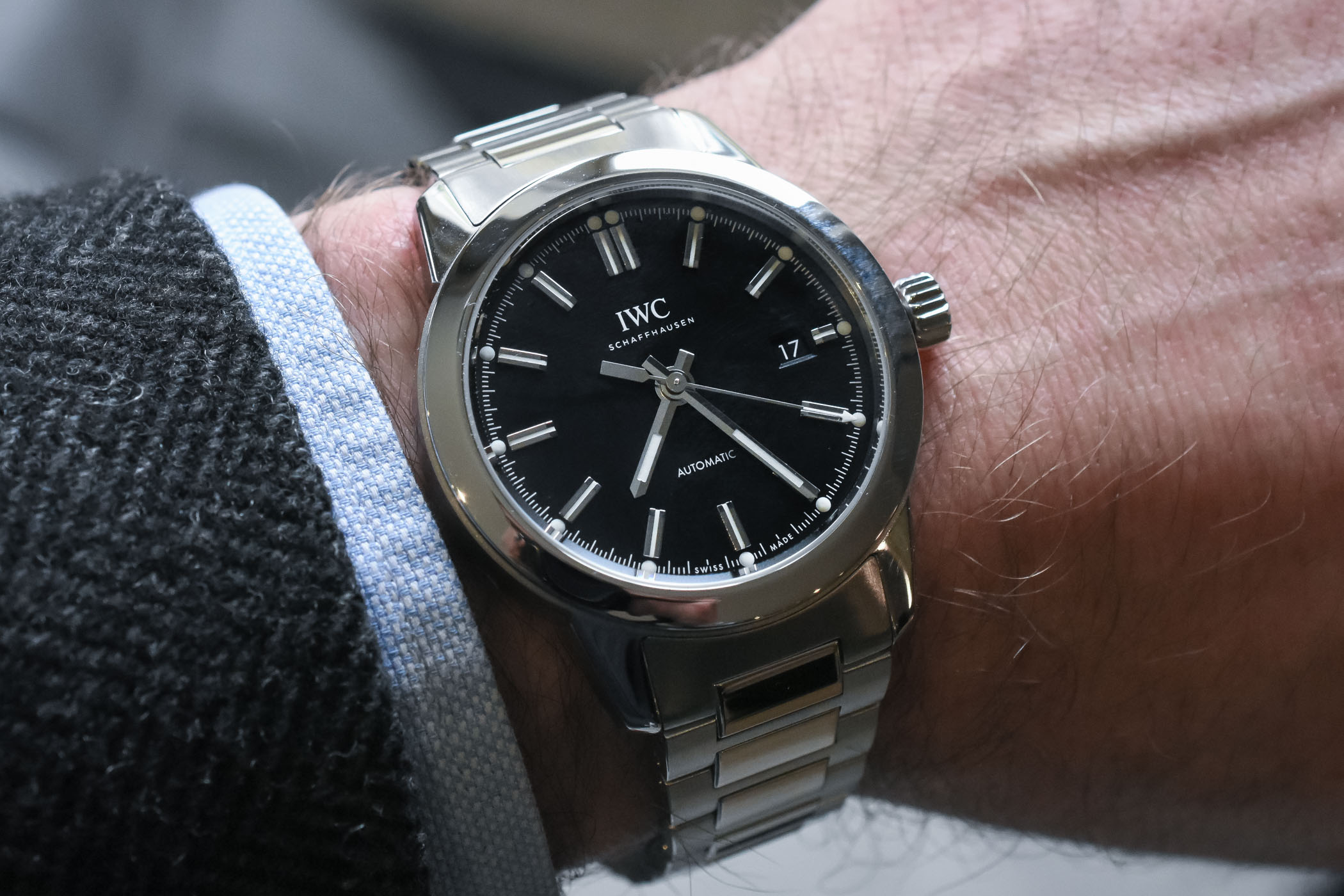Review – Omega Seamaster Aqua Terra 150m – A Serious Contender for the One-Watch collection – WATCHLOUNGE
The Omega Seamaster Aqua Terra 150m is arguably one of the better value, all-round, entry-level watches available on the market today. It’s also most likely flying completely under your radar. In the collection since 2003, it received a subtle visual refresh last year, along with an in-house movement in the form of the Master Chronometer calibre 8900. Striking the balance between everyday wear and elegant dress watch, the Aqua Terra is the perfect choice for those people looking for one watch for all occasions. Read our detailed review below to find out what makes this model so attractive.
Pitched as an ‘entry-level’ model, the Omega Seamaster Aqua Terra 150m delivers a surprising amount of bang for your buck. It may not carry the same level of prestige as say the Rolex Datejust 41 in Oystersteel, but it also costs approximately 30% less whilst offering many similar benefits. Although it belongs to the Seamaster family, it’s not a dive watch as such. Instead, Omega’s describes it as a sophisticated watch imbued with ocean spirit. In layman’s terms that essentially means it’s designed for the casual sailing enthusiast, not the deepsea diver, an ethos that permeates the design of the watch.
Mục Lục
The Case
The Omega Seamaster Aqua Terra is available in two case sizes; 38mm and 41mm. Today we’re looking at the latter, which is also the more popular of the two, although smaller cases sizes are certainly enjoying a renaissance. The previous version was actually larger at 41.5mm, so this slight reduction in size is welcome. When you plan to wear a watch every day, comfort is a key consideration.
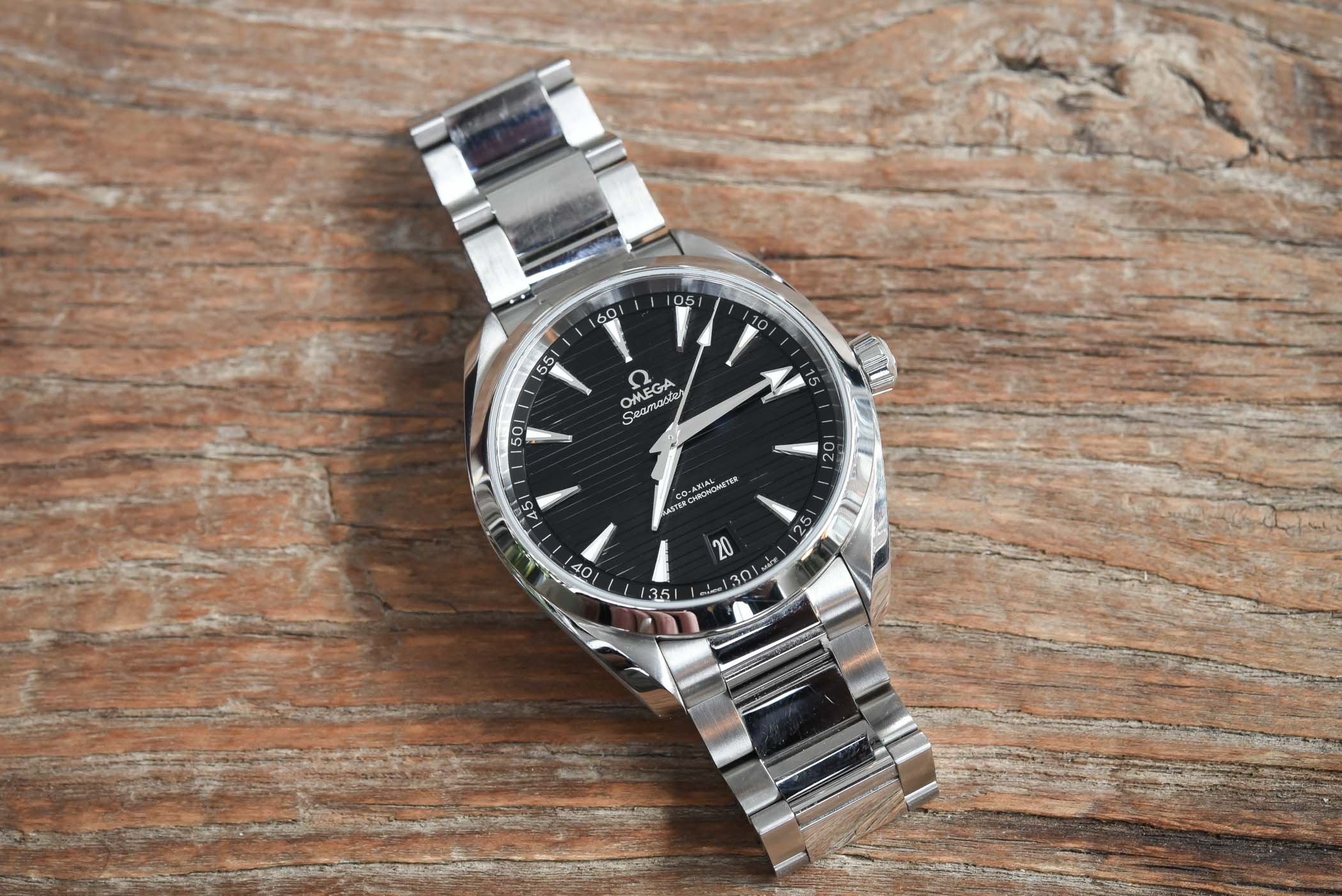
The case is also now symmetrical, which seems strange to say but in the previous model, the crown was partially absorbed by the caseband on the right-hand side. It’s probably not something you would notice unless it was pointed out to you, but it does give the new Aqua Terra a more balanced look on the wrist – and also explains the 41mm diameter instead of 41.5mm.

Aesthetically, the case is understated, with some subtle touches that make it a watch you can dress up or down. The bezel is polished as are the outer flanks of the lugs, contrasting nicely against the brushed surfaces. Just one look at the case and you know this is not a dedicated tool watch. That said, it still offers water-resistance to a healthy 150m (500 feet). The caseback features a wave edge design, in keeping with the overall nautical theme of the watch. It wears comfortably on the wrist and can be easily paired with a suit and tie or jeans and sneakers.
The Dial
The dial of the Omega Seamaster Aqua Terra is probably its most distinguishing feature and is decorated with a horizontal “teak” pattern inspired by the wooden decks of luxury sailboats. The effect on the black dial model we’re reviewing here is subtler than some of the other dial colours available, but it still adds an extra element to the design making it instantly recognisable on the wrist. Again, this is an update from the previous model, which featured vertical lines. I’m sure I’m not alone in saying I prefer the horizontal design. It’s less pronounced than the previous version and looks nicer in my opinion. Plus, it better conveys the nautical theme.
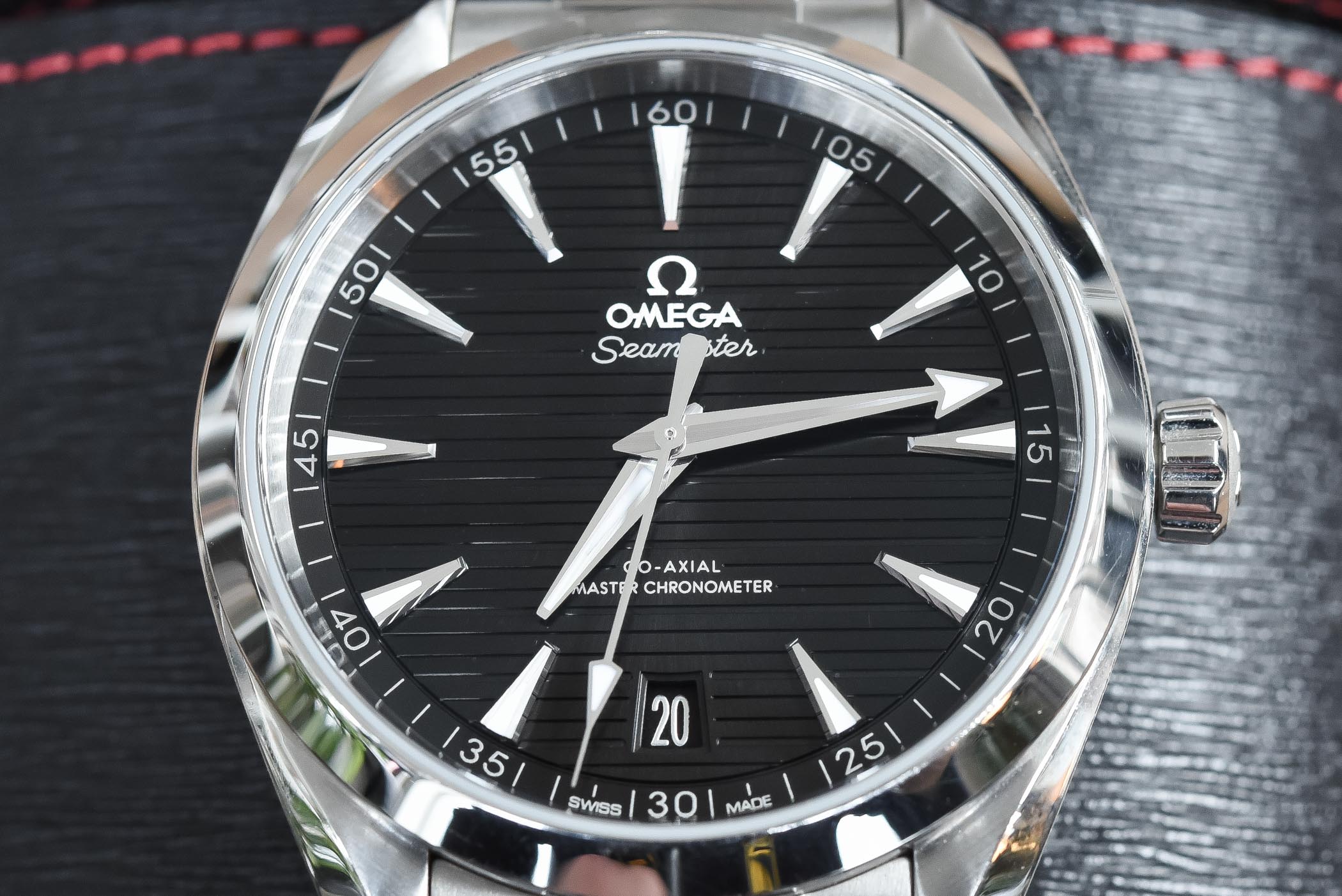
This is not the only change Omega has made to the dial, however. In a welcome move, the date window has been relocated from 3 o’clock to 6 o’clock. The “water-resistance” wording has also been removed from the dial and engraved on the caseback instead. Both changes are relatively minor but they make a surprising difference to the overall appeal of the dial. It looks more balanced and symmetrical now, which ties in nicely with the focus on the symmetry of the case. Rhodium-plated “Broad Arrow” hands and indices filled with white Super-LumiNova complete the time display, adding a touch of sportiness to the dial. Again, all the required features for a sporty use, but nothing extreme so it can fly under the radar with a suit.
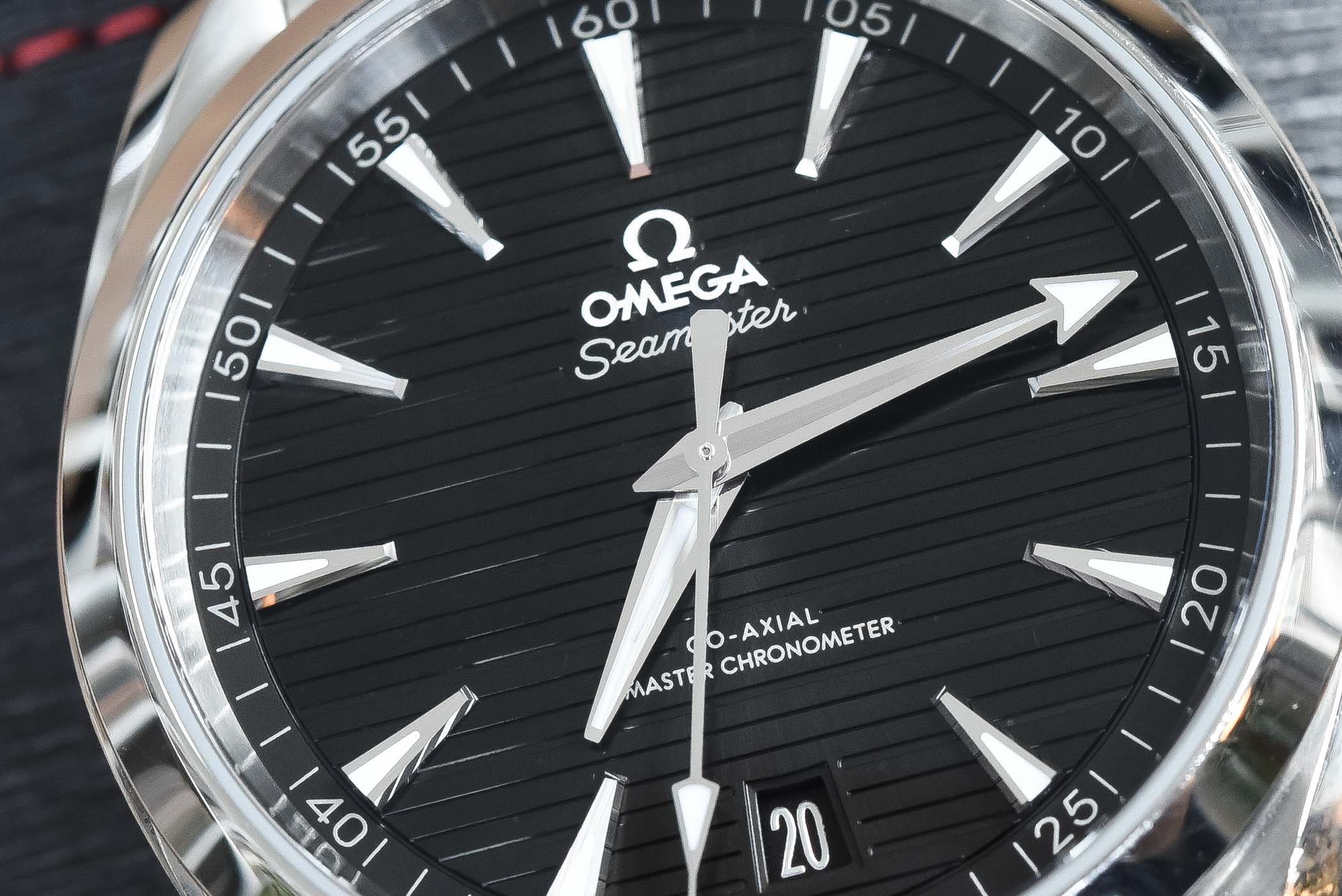
The Movement
It’s here that the Aqua Terra really shines when it comes to value for money. Turning the watch over, a sapphire caseback reveals the inner workings of the Omega Master Chronometer calibre 8900. If you’re not familiar with Omega’s Master Chronometer Certification, I highly recommend you watch our in-depth video here. With the Master Chronometer program, Omega set out to build the highest quality, most reliable movements possible, regardless of the environment they need to operate in.
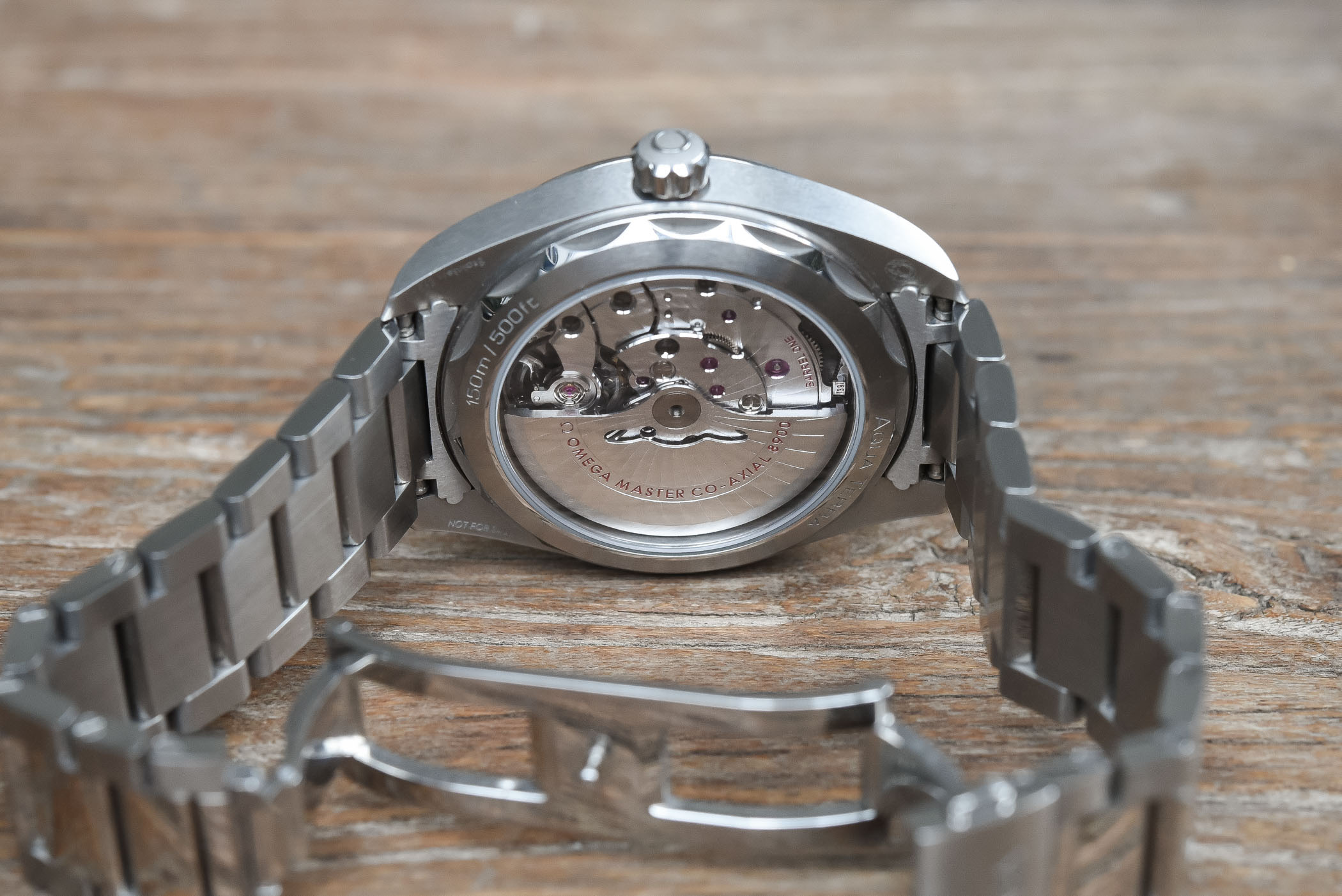
The calibre 8900 is a chronometer-certified automatic movement that comes with an impressive 4-year warranty. It features two barrels, which combine to offer a total power reserve of 60 hours. It uses silicon parts for the entire regulating organ and is capable of resisting magnetic fields up to 15,000 gauss. The arabesque decoration and diamond-cut bevels are simple yet attractive and can be appreciated through the caseback.
The Bracelet
The model we had in for review featured a polished and brushed bracelet in matching steel, with a double fold-over clasp. Omega says it has improved the integration between the case and bracelet on this latest version of the Aqua Terra, helping it to sit flatter and even more comfortably on the wrist. There are also some forty different strap variations available from Omega, ranging from leather to NATO, so you can easily customise this model to your specific tastes.
For those looking for a great, all-round, everyday watch, the Omega Seamaster Aqua Terra 150m really is the total package. And with pricing starting at EUR 5,100, it’s also very competitively placed relative to similar offerings on the market (see below). More details on omegawatches.com.
the competition
With such “daily-wear” watches, it is interesting to see what could be the alternatives. And obviously, there are a lot of them available, but Omega’s package is that good that few can compete. See for instance our guide: 3-Hander Watches with Sports-Elegant Look.
Rolex Explorer 39mm 214270
Obviously, we cant think Omega without looking at its main competitor, Rolex. So what could be the equivalent of the Aqua Terra in the crown’s catalog? If we stick to the definition of a simple, sporty-elegant piece with 3-hand display, the Explorer 1 should do the job. Compared to the Omega, it has a smaller case (39mm), no date, but an equal mix of elegance and sportiness, making it a equally good all-rounder. The overall quality is, of course, superb however Omega takes the lead in terms of movement, with its ultra-innovative Master Chronometer. Rolex, with the old 3135 calibre, can’t compete here. Also, the Rolex is substentially more expensive, at EUR 6,000.
Tudor Black Bay 41
Also produced by the Rolex group, the Tudor BB 41 is a nicely priced alternative. In terms of style and dimensions, it feels rather equal to the Aqua Terra. However, it is slightly more tool-ish than the elegant Omega – the BB 41 can be worn with a suit but will be less “a propos” than the Aqua Terra. Where the Omega plays on the yachting codes, the BB uses vintage elements to bring some charm. The main reasons for its lower price (EUR 2,770 on steel bracelet) are a less complex case/dial and, of course, a simple ETA no-date movement.
Baume & Mercier Baumatic
With its new Baumatic collection, Baume et Mercier stroke hard, with a watch that truly is an all-rounder – a casual-elegant style that is reinforced when worn on a steel bracelet – with some great arguments, including its newly introduced proprietary movement. Of course being priced at EUR 2,750, it remains less refined and advanced than the Omega, however the 5-day power reserve and the precision are quite impressive for the price range. Yet, it might lack the aura and the luxurious appeal of the Omega, and the design is very conservative (also exists with black dial).
IWC Ingenieur Automatic 3570
IWC also has a watch that fits in the sporty-elegant category: the 2017 Ingenieur 3570, meaning the time-and-date automatic version, with black dial and steel bracelet. The design is pleasant, slightly vintage inspired and coherent with the early Ingenieur models. However, at EUR 6,150 it is rather expensive considering its simple Selitta-based movement. The case and dial are beautifully crafted.
This post first appeared on Monochrome Watches – An online magazine dedicated to fine watches.





